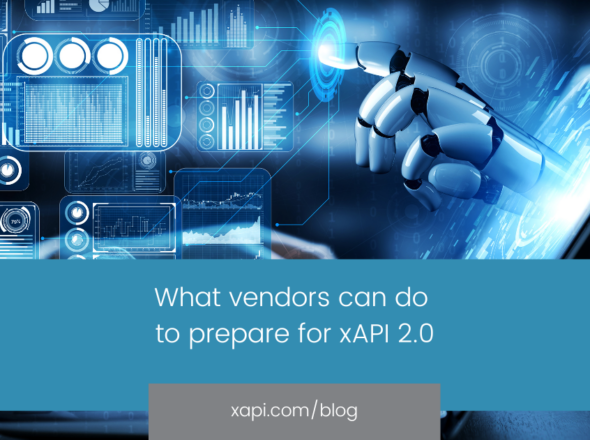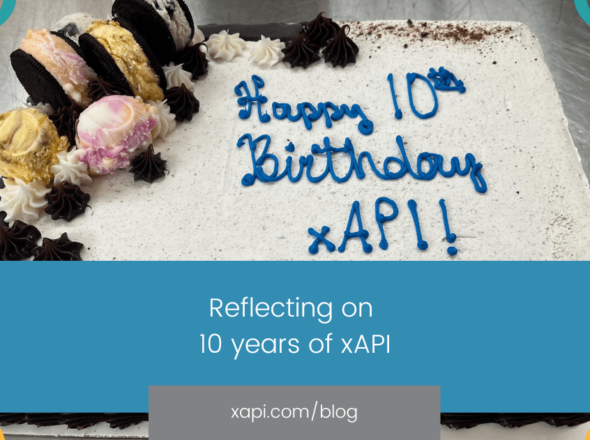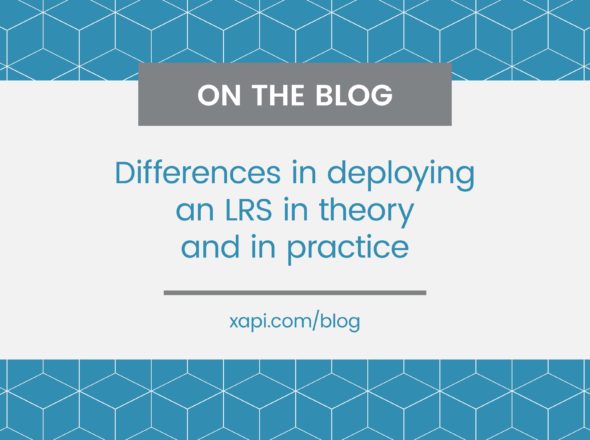We have many folks that come to us from the SCORM world and want to know the difference between SCORM and xAPI. I answer this question so much that I thought its worth addressing (at a pretty high-level) in this blog post.
First, I’ll unpack the limitations of SCORM (much of this you may already be aware of).
- SCORM is reliant on a web browser. This means it’s impossible to track learning or job performance experiences that happen outside of a web browser using SCORM. Examples: a CPR dummy, a drivers ed simulation, etc.
- SCORM is usually reliant on a constant Internet connection. This means it’s extremely difficult to track disconnected learning or job performance experiences using SCORM. There are a couple of offline SCORM players out there. We have one that’s works really well, but most of them are typically unstable (SCORM just wasn’t intended to be used this way).
- SCORM content must be played via an LMS. We’re among those that believe most of our learning takes place outside of the LMS. With SCORM’s reliance on an LMS to play and track, the majority of our learning experiences (our most valuable learning experiences at that) are not being tracked today.
- SCORM can only track a single learner. This means it’s impossible to track team-based learning using SCORM.
- SCORM can only track a limited number of things, i.e. completion, time spent in course, pass/fail, a single score. This means there is no way for SCORM track anything beyond a course or assessment (and actually provides very little data for each).
There are other limitations of SCORM, but most are a result of the limitations listed above.
So how is xAPI different, and we would argue better, than SCORM? Simply put, it does away with all of the limitations listed above. Here are a few key benefits of the Experience API.
- The Experience API can track any experience, anywhere. We’re no longer reliant on a web browser, constant Internet connection or an LMS in order to play and track our experiences. This opens up a world of opportunities for organizations and institutions needing to train their folks. Organizations will now be able to supplement their LMS learning with learning experiences that live outside of the LMS, and use their LMS as the central repository for all of their learning records if they choose to. Some may decide to do away with their LMS entirely and replace with xAPI focused solutions.
- The Experience API uses a simple, flexible, but robust statement structure to track experiences. ‘I did this’ (Noun, Verb, Object) is the core of every xAPI Statement. Examples: ‘Andy attended DevLearn 2012’. ‘Andy resuscitated CPR dummy’. ‘Andy closed a $30,000 SCORM Engine deal’. This simple structure allows us to track any experience in any context.
- The data that the Experience API tracks is intended to be portable (unlike SCORM). xAPI Statements are sent to and stored in a Learning Record Store, which can be integrated with an LMS (see our xAPI Engine solution). The LRS is designed to store these statements, but is also designed to distribute these statements to other systems that have support for the Experience API, i.e. another LRS, an LMS, a reporting tool, a HR management system, a Talent Management System, etc.
- Because the Experience API can be used to track any experience, anywhere, organizations can also use it to track performance support and job performance. In our opinion, this is the holy grail of big data. When an organization is tracking their learning/training, performance support and job performance using the same language, i.e. xAPI, they will be able to determine the effectiveness of their training programs and measure ROI.
There are numerous other benefits of the Experience API, many of which can be found in our “Layers of the xAPI Onion” article on tincanapi.com. Here’s a PDF of this article if you’d like to take it with you.
If you still have questions after reading this about how the Experience API, and technologies that adopt it, can benefit your organization, please feel free to reach out. We’re always happy to help!


